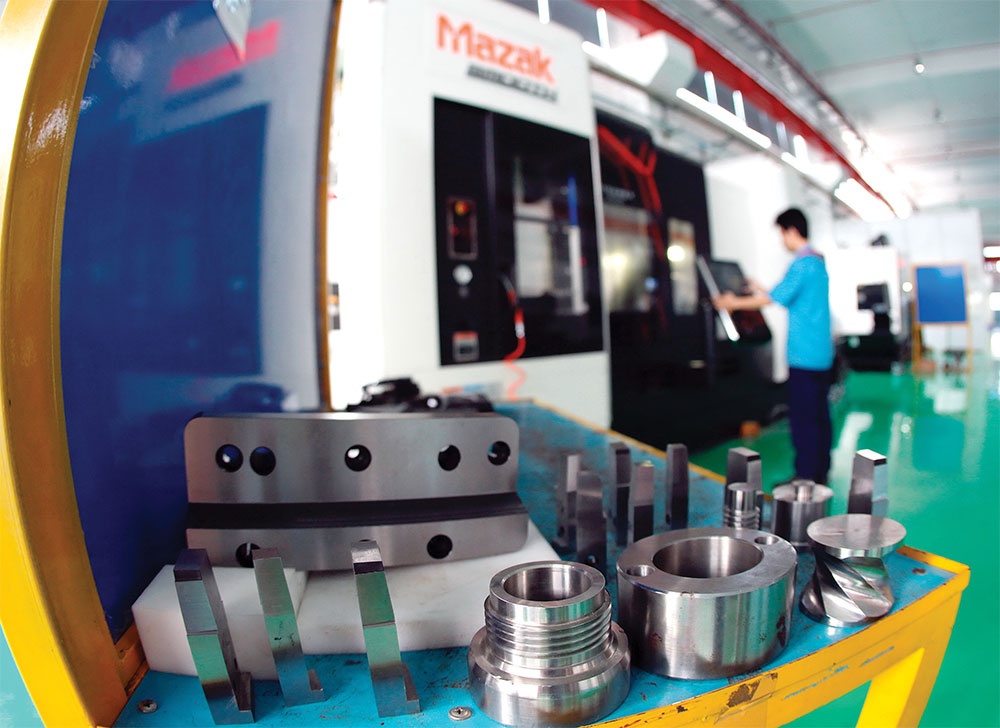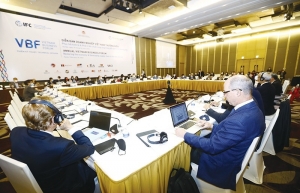Domestic companies striving to become trusted vendors of FIEs
According to a recent Japan External Trade Organization (JETRO) survey, 86 per cent of Japanese businesses would like to raise their purchase ratio in Vietnam over the next three years.
The coronavirus pandemic, disruptions of global supply chains, and increases in logistics fees have left foreign-invested enterprises (FIEs) eager to tap into domestic suppliers.
“Currently, factories in China are relocating to Vietnam, while South Korean companies are also creating more factories and investment projects here. Investment and manufacturing activities in Vietnam are promising to develop strongly in the future,” said Matsumoto Nobuyuki, JETRO’s chief representative in Ho Chi Minh City.
In one example, the Towa Industrials factory that produces brakes for Japanese Shinkansen trains has a ratio of only 18 per cent local supply, which it would like to raise to a higher level.
“At present, the number of local vendors is quite small. To accelerate the production, we are looking for more Vietnamese vendors to reduce dependence on imported materials and spare parts from overseas,” said Yutaka Watanabe, general director at Towa.
“However, Vietnamese suppliers can only meet a part of the total demand of foreign-invested enterprises. For example, they may be able to produce 100 or 1,000 items, but if we ask for 10 or even 100 times this amount, they cannot meet supply or ensure the quantity and quality.”
 |
| Additional local businesses are making a mark in global supply chains, photo Le Toan |
The Ho Chi Minh City Association of Mechanical and Electrical Enterprises said that, despite the difficulties encountered last year, its member companies still reported fairly positive outcomes, with a rise in the number of key partners and orders from the likes of Japan and South Korea. This year, the number of orders from FIEs increased by 20 per cent.
Do Phuoc Tong, chairman of the association, said, “Enterprises are busy because there have been many orders since early this year. There are many large partners with new orders in large quantities.”
More and more local businesses are setting foot in global supply chains. Last year, Samsung advised 260 Vietnamese enterprises to increase productivity, reduce errors, decline inventory, and enhance their opportunity to join new supply chains.
Hanpo Vina JSC supplies plastic injection products to Samsung. Its product defect rate decreased by 53 per cent, and the factory has been redesigned to easily locate inventory and manage the quantity of its inventory.
Thinh Vuong Manufacturing and Trading Co., Ltd. provides plastic display tray products for Samsung. The company has reduced its defect rate, mould replacement time, and loss rate.
Samsung’s number of domestic vendors has improved significantly from four enterprises in 2014 to nearly 200 in 2020.
According to the Vietnam Association of Foreign-Invested Enterprises, the domestic purchasing rate of such enterprises in Vietnam has increased, though not much, while in several regional countries it has decreased.
A few months ago, numerous Japanese businesses in supporting industries started to build factories in Hanoi Southern Supporting Industrial Park, manufacturing components for aircraft, trains, automobiles, ships, agriculture, fisheries, and more.
“The investment of Japanese businesses in supporting industries will contribute to raising the domestic purchase of FIEs in manufacturing, as well as facilitating supply chain leaders to develop,” said Nguyen Hoang, chairman of the Hanoi Supporting Industries Business Association.
Against the sharp increase in domestic purchases and the rapid development of FIEs in supporting industries in the future, local businesses are facing difficulties in seizing opportunities to join global supply chains.
In Ho Chi Minh City’s Saigon Hi-tech Park, foreign investment accounts have hit 85 per cent, but the domestic purchase rate is just 10 per cent, far worse than expectations.
“Links between local and foreign suppliers have not been good previously, so we have yet to utilise FIEs’ resources to develop domestic production. Processing and manufacturing industries should be developed strongly in quality and efficiency, not just in quantity,” said Tran Anh Thi, head of the Saigon Hi-Tech Park Management Board.
According to the Vietnam Association for Supporting Industries, there are as many as 400 Vietnamese companies in supporting industries that can participate in the supply chains of FIEs and export. The demand is soaring, but if they cannot meet the orders, the ability of domestic vendors to invest and innovate in technology will become even more challenging.
Watanabe of Towa added, “The Vietnamese government and also banks should provide more policies to deliver further capital to domestic suppliers to improve production capacity, expand factories, and also catch up with the development needs of supply chain leaders.”
 | International businesses seek restoration of supply chains While Vietnam is working to spur economic recovery and development, international businesses are seeking stronger actions to develop supply chains to facilitate their future expansions. |
 | EU, ASEAN to hold summit to develop supply chains The European Union (EU) and the Association of Southeast Asian Nations (ASEAN) will hold a summit of national leaders for the first time in December to discuss expanding trade and infrastructure assistance as the EU seeks to strengthen ties with ASEAN. |
What the stars mean:
★ Poor ★ ★ Promising ★★★ Good ★★★★ Very good ★★★★★ Exceptional
Related Contents
Latest News
More News
- Partnerships drive sustainable finance (January 07, 2026 | 09:23)
- FDI inflows reach $38.42 billion in 2025 (January 06, 2026 | 17:55)
- $2.1 billion Nghi Son LNG-fired thermal power plant waits for investor (January 06, 2026 | 17:51)
- GE Vernova powers up Vietnam with first 9HA gas power plant in the country (January 06, 2026 | 16:54)
- Solid finish for manufacturing after volatile year (January 06, 2026 | 08:50)
- Meiko strengthens Vietnam operations with new PCB plants (January 06, 2026 | 08:49)
- Ho Chi Minh City backs $2 billion AI data centre with dedicated task force (January 06, 2026 | 08:43)
- PM sets January deadline for high-speed rail consultant (January 06, 2026 | 08:40)
- New decree spurs on PPP implementation (December 31, 2025 | 19:01)
- Global alliance develops $1 billion AI data centre network in Vietnam (December 30, 2025 | 10:08)

 Tag:
Tag:




















 Mobile Version
Mobile Version